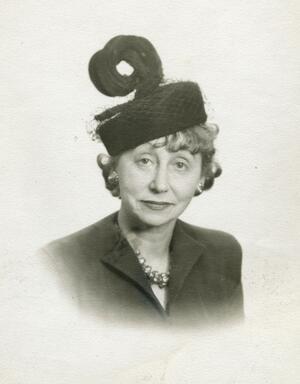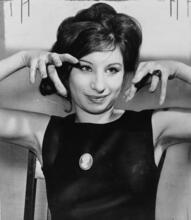Adeline Schulberg
Schulberg became a socialist early in her life, and after marrying reporter B.P. Schulberg in 1913, she got her new husband an assignment doing a film documentary about suffragette Sylvia Pankhurst. In 1918 the couple moved to Hollywood, where Schulberg worked in child welfare, organized birth control clinics, and founded the first progressive school in California, while her husband worked for Paramount Pictures. She divorced in 1933 and used her Hollywood contacts to open a talent agency representing stars like Marlene Dietrich. She sold the agency and moved to London at the beginning of World War II, creating an underground railroad to rescue refugee actors, writers, and filmmakers from Nazi Europe. After the war, she returned to New York as a talent scout for Columbia Pictures. She also founded a literary agency.
Adeline Schulberg was a successful talent and literary agent. A committed socialist in her youth, she later became involved in child welfare, education, and other social issues.
Early Life and Family
She was born Adeline Jaffe on April 14, 1895, and arrived in the United States from Russia as an infant. Following the rise of antisemitic pogroms that swept Eastern Europe at the turn of the century, she, along with her mother, Hannah, and her two older brothers, Joseph and David, joined the two million Jews who would make the trip to the United States over a twenty-year period. The Jaffes were met in New York by Adeline’s father, Max, and they moved to Madison Street on the Lower East Side, a densely packed neighborhood filled with Jewish immigrants. Poverty was widespread on the Lower East Side, and the Jaffes were no exception. These early surroundings influenced Schulberg’s political views, and she became an active socialist who knew many of the movement’s leaders, including Leon Trotsky and George Sokolsky.
In 1913, she married an ambitious New York World reporter, B. P. Schulberg. Her husband soon got a job working for Adolph Zukor’s Famous Players, but it was Adeline Schulberg’s work in the suffrage movement that got B. P. his first assignment, a film documentary about the English suffragist leader Sylvia Pankhurst. The couple moved uptown to Harlem and Schulberg soon gave birth to a son, Budd. From a very young age she had a love for books and had dreamed of becoming a librarian. Although this dream was never fulfilled, this slight woman with boundless energy was determined to educate her son, taking him to lectures at nearby Columbia University and making sure that he was never without a book to read.
Hollywood and Activism
Five years after the Schulbergs were married, they moved to Hollywood, a young city in California that a small group of Eastern European immigrants had been rapidly turning into the motion picture capital of the world. When her husband got a job as a producer at Paramount Pictures, Schulberg became active in child welfare and education, and received a degree from the University of California in 1926. Drawing upon her socialist roots, Schulberg organized birth control clinics throughout the West. In 1929, Schulberg helped to found the first progressive school in California, which was based on the philosophies of educational innovator John Dewey.
Her marriage to B. P. Schulberg lasted for twenty years. They divorced in 1933, and Schulberg thrived in her new-found independence. Using the connections she had made in the Hollywood community, Schulberg set up the Ad Schulberg Agency and represented some of Hollywood’s biggest stars, including Marlene Dietrich, Fredric March and Herbert Marshall. Schulberg sold the agency in the 1930s, and since the terms of the agreement barred her from practicing in the United States, she moved to England. When World War II began in 1939, Schulberg set up an “underground railroad” in London for refugee talent from Nazi-occupied Europe.
Literary Agent
After the war, Schulberg returned to New York City and became a talent scout for Columbia Pictures. Shelley Winters was her best-known discovery. Seeking to reestablish the control she had wielded as head of the Ad Schulberg Agency, she formed a literary agency. Her clients included her son, Budd, whose most famous work was What Makes Sammy Run?, novelists Vicki Baum, Fannie Hurst, and Ruth McKenney, author of My Sister Eileen, Roger Price, Mark Harris, and Rex Reed.
Adeline Schulberg died in New York City on July 15, 1977.
Obituary. NYTimes, July 16, 1977, 24:1.
WWIAJ (1938).
Schulberg, Budd. Moving Pictures: Memories of a Hollywood Prince. Chicago, IL: Ivan R. Dee, 2003.



